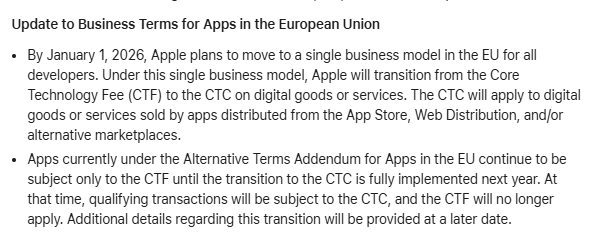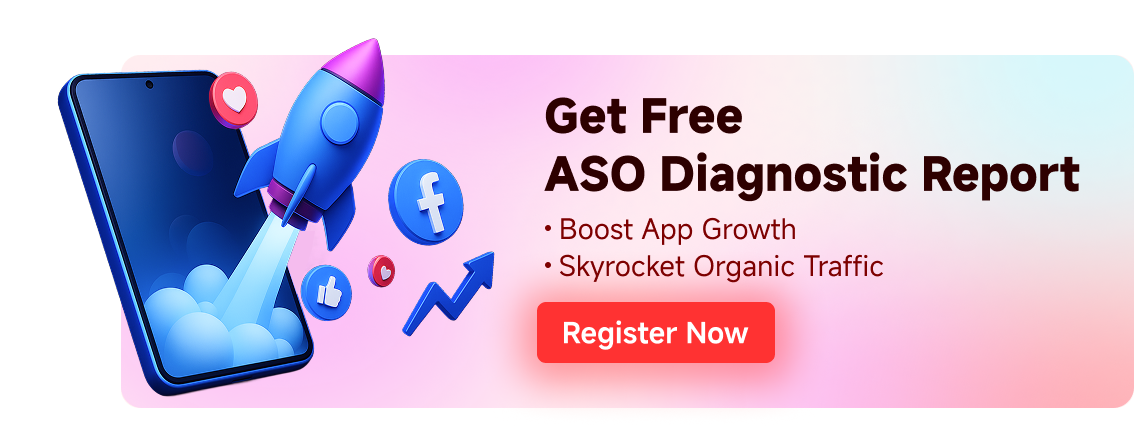
Loading...
Free consultation with ASO specialists
Doing ASO for the first time or have no idea how to carry out targeted optimization of your app?
We offer one-on-one customized services provided by app marketing specialists
Apple’s New EU Policy: Behind Side loading "Openness," a Fee Maze Sparks "Malicious Compliance" Debate
2025-07-03
Tim Sweeney’s criticism on X laid bare the essence of this so-called "openness." Apple’s new EU policy is seen by developers as an elaborately staged digital sleight of hand.

On June 26, 2025, meeting the EU’s deadline, Apple released a notice titled "Updates for apps in the European Union." This policy update, ostensibly responding to the EU’s Digital Markets Act (DMA), promises to allow EU users to download apps directly via third-party app stores and developer websites.
On the surface, this breaks Apple’s 17-year walled garden. However, as developers scrutinized the details, a wave of anger at perceived deception quickly spread.
01 Deadline-Driven Compromise: A Policy Shift Under Fine Pressure
Apple’s choice to release the policy on June 26th was no coincidence. Just prior, the European Commission had fined Apple €500 million (approx. $588 million USD) and explicitly demanded policy changes compliant with the DMA by that date. In this standoff, the timing itself reveals the reactive nature of the new policy.
According to Apple’s announcement, starting with iOS 18.6 and iPadOS 18.6, EU users will be able to install apps directly via third-party marketplaces (like the Epic Games Store) or developer websites. This marks the first time in Apple’s history that side loading capability is opened, theoretically allowing users to bypass the App Store.
The opening of the payment system was also highlighted. Developers can use third-party payment processing systems within apps, no longer forced to rely solely on Apple’s In-App Purchase (IAP). Yet, hidden behind these seemingly open changes lies a complex fee structure that has left developers stunned.
02 CTC Replaces CTF: A "New Name, Same Game" Fee Scheme?
Apple announced in the notice: "By January 1, 2026, Apple plans to implement a unified business model for all developers in the EU. Under this unified model, Apple will transition from the Core Technology Fee (CTF) to the CTC for digital goods and services."

This enigmatic "CTC" became the most contentious point. Apple didn’t even spell out CTC's full name in the announcement, but its fee structure (as analyzed by other developers) is staggering in complexity:
-
Initial Acquisition Fee: 2% charged when a user first downloads an app via the App Store.
-
Store Services Fee: 13% or 5% charged based on service tier.
-
Core Technology Commission: A fixed 5% charge.
When calculating actual costs, developers found that even opting for the lowest service tier results in a combined rate of 12% (2% + 5% + 5%). Choosing the higher tier pushes it to 20%. This is barely different from the original "Apple Tax," and doesn’t include the cut taken by third-party payment platforms themselves.
"This is malicious compliance, plain and simple," Epic Games CEO Tim Sweeney sharply criticized on X. "Apple has designed new fee traps to continue squeezing developers."
03 Malicious Compliance Cloud: Control Lust Beneath the Open Facade
Analyzing Apple’s new fee structure reveals a sophisticated mechanism to maintain control:
-
Installation Monitoring: Apps installed via third-party channels still require installation verification using Apple-authorized technology.
-
The "Unavoidable" Core Commission: The 5% Core Technology Commission applies to all digital transactions, regardless of distribution channel.
-
Complex Compliance: Third-party marketplaces must submit a €100,000 letter of credit and undergo Apple audits.
This design has drawn scrutiny from EU antitrust regulators. Sources indicate the European Commission is assessing whether the new policy genuinely satisfies DMA requirements. As one Brussels antitrust lawyer stated: "True openness should lower market barriers, not build new walls with complex rules."
Developer community reactions are more intense. Independent app studio lead Maria Lund vented on social media: "We spent three days dissecting the policy docs and still aren't sure which fee tier an €8 million annual revenue team should choose. This is compliance torture!"
04 The Developer's Dilemma: Freedom or Cost?
The policy seemingly offers distribution freedom but forces a difficult choice:
-
Stay on the App Store: Continue paying the standard 17% commission (10% for under €1 million annual revenue).
-
Switch to Third-Party Distribution: Face 12-20% CTC fees + payment processing fees (typically 3-5%) + costs to develop new distribution channels.
-
User Trust Risk: Third-party installs may trigger security warnings, lowering conversion rates.
"This isn't a free choice; it's picking between different extraction methods," noted Max Weber, CTO of a Berlin mobile dev firm. "Especially for small teams, the cost of evaluating compliance for the new model might outweigh any commission savings."
Data fragmentation is another major concern. Distributing apps through multiple channels complicates user analytics, version management, and customer support. Integrating third-party payment systems also requires extra development resources, potentially negating any rate advantage.
05 Global Ripple Effects: The EU as a Testing Ground
This EU policy shift could have worldwide repercussions:
-
Regulatory Blueprint: If the EU deems Apple compliant, it could become a template for regulators elsewhere.
-
Technology Spillover Risk: Side loading-related tech might "accidentally" spread to other regions via system updates.
-
Developer Migration: Some developers may relocate company registration to the EU to access the new rules.
Notably, Apple buried a crucial hint in the notice: "The Initial Acquisition Fee applies only to App Store downloads." This suggests future fees for web distribution, leaving room for policy changes post-2026.
Developer groups are already preparing formal complaints to the European Commission. They argue that DMA Article 6(12) explicitly forbids gatekeepers from "preventing consumers from linking to businesses outside their platforms," and Apple's fee structure constitutes a de facto barrier.

Breaking Through: Finding a Path in Apple's Maze
As the January 2026 CTC implementation nears, developer strategies are emerging:
-
Cost Simulation Tools: SaaS providers are building CTC calculators to predict optimal distribution paths.
-
Hybrid Distribution: Placing free apps on third-party stores while keeping paid versions on the App Store.
-
PWA Resurgence: Renewed interest in Progressive Web App (PWA) technology.
In this battle with the tech giant, information is power. No matter how Apple reshapes its walls, the force of innovation will find cracks to grow. A truly open ecosystem ultimately cannot be confined by intricate fee algorithms.
When Epic Games announced plans to launch its iOS store in Europe, Tim Sweeney declared: "We've passed through the first gate, but the maze has only just begun."
Are you evaluating the impact of Apple's new policy on your app? Contact your dedicated account manager now for a professional ASO diagnostic report!
Related recommendations

